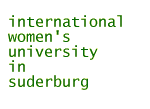| |
- DRY SIRDO with double compartment to process human excreta plus organic solid waste; with one
compartment to process only human excreta:
- to combine one practical action to be undertaken here
in Suderburg with the reality of GTA's work now taking place in Mexico
- to compare 2 different
water situations: the desert (USA-Mexico border) with the natural wetland in Mexico City
(Xochimilco)
- evaluation of 15% of the dry units installed in these places (1999-2000) in
parallel with the evaluation of one dry unit to be installed and use at Suderburg's university
campus (see images below and click on them to enlarge)
- compare the bio-fertilizer produced by other composting units with samples taken locally
during the excursions
- to make a statistical analysis of data collected during 20 years by GTA in
units installed in different climes and seasons, in order to determine the operation range of the
system and probable efficiency
- social action methodology: follow up techniques, assessment of
users' management of the dry units and the impact on the technical performance of the system.
- WET SIRDO:
- to process grey and black waters separately, using sedimented sludge obtained from
black waters as inoculant in order to transform solid organic waste into biofertilizer by means of
aerobic decomposition
- to process mixed grey and black waters using the sludge as inoculant to
decompose solid organic waste
- to compare the outputs of both situations
- to make an
statistical analysis of data collected by GTA since 1980
- GTA's methodology on planning for
recycling at a micro-regional level in rural and urban communities
- to collect information about
"saporifera" plants from several countries, discuss the difference between soap,
detergents and "saporifera" plants in relationship with wastewater quality.
- Excursions:
- for grey water treatment, and vacuum toilet systems, in Hannover-Hägewiesen
- composting toilets and other permaculture technology in Bielefeld - Waldquelle
- composting
company and dumping site in Lüneburg
|
|

